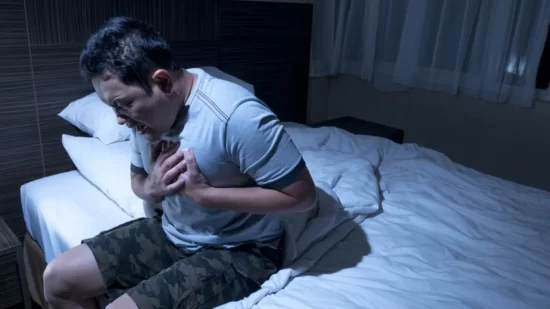All panic attacks can be terrifying, but they can be even more terrifying if they wake you up in the middle of the night. These attacks, known as nocturnal panic attacks, might potentially contribute to sleep disruptions and leave you exhausted during the day. In this article, we look at the symptoms, causes, and treatment of nocturnal panic attacks.
Nocturnal Panic Attacks
Nighttime (nocturnal) panic attacks might occur without a clear trigger and wake you up. Sweating, high heart rate, shaking, shortness of breath, heavy breathing (hyperventilation), flushing or chills, and a sense of impending doom are all symptoms of a panic attack. These concerning signs and symptoms can be mistaken for those of a heart attack or another significant medical illness. Although panic attacks are unpleasant, they are not harmful.
They often last only a few minutes, although it may take some time to calm down and return to sleep following one. People who suffer from nocturnal panic attacks are more likely to suffer from panic attacks throughout the day.
What Is the Difference between Nocturnal Panic Attacks and Night Terrors?
Night terrors are a disruptive sleep disorder (parasomnia). A person having a night terror has symptoms similar to a nocturnal panic attack. One significant difference is awareness.
People who have night terrors are often unaware that they are suffering from them. They may appear to be awake—and then scream, jump out of bed, and run around. They are actually asleep, and waking them is difficult (and often not recommended). When a night terror ends, the person who experiences it returns to sleep. They may not recall the event in the morning. Night terrors are more common in children, although adults can also have them.
A panic attack wakes you from your sleep. You are aware of your fear and the accompanying signs of a panic attack. It may take a while to fall asleep again. Nocturnal panic attacks primarily afflict teenagers and adults.
Nocturnal Panic Attacks Symptoms
Nocturnal panic attacks can occur without a clear cause and wake you up in the middle of the night. Sweating, heart palpitations, and chest pain are all frequent somatic feelings. Strong emotions, paired with distressing bodily sensations, may contribute to the anxiety that the attack would result in a loss of control over oneself.
Similarly to daytime panic attacks, nocturnal panic attacks occur when a person suffers four or more of the following symptoms:
- Chest ache
- Feelings of chills or hot flushes
- choking sensation
- Depersonalization or derealization
- Dizzy, lightheaded, or faint?
- The fear of dying
- Concern about losing control
- a sense of being suffocated
- Nauseousness or stomach discomfort
- Feelings of numbness or tingling
- Palpitations or a rapid heartbeat
- Breathing difficulty
- Sweating
- Shaking or trembling
Although panic attack symptoms normally peak within a few minutes before gradually dissipating, the ramifications of the attack can last much longer. So, excessive worry and fear linked with this event frequently result in insomnia.
Panic attacks are most typically associated with panic disorder, although they have also been connected with depression, post-traumatic stress disorder (PTSD), agoraphobia, and specific phobias.
What Causes Them?
Researchers are still working to figure out the causes of nocturnal panic attacks. What they do know is that these panic attacks are common among panic disorder patients. Up to 71% of people who have daytime panic attacks have had a nocturnal panic attack at least once.
Having said that, doctors have found numerous characteristics that can increase a person’s risk of having nocturnal panic attacks:
- Chemical imbalance in the brain.
- Panic attacks run in the family
- Significant life stress
- Traumatic occurrences
- Depression or social anxiety disorder are examples of underlying disorders.
- Insomnia or sleep apnea.
- Obsessive-compulsive disorder (OCD).
- Substance use disorders, including alcohol use disorder.
The majority of nocturnal panic attacks occur during non-REM sleep, primarily in stages 2 and 3. This means that they aren’t a reaction to Stage 4 sleep terrors. This also distinguishes these panic attacks from nightmares, which typically occur during REM sleep.
Nocturnal Panic Attacks Treatment
Help is available if you are having panic attacks that are interfering with your sleep or that occur during your waking hours. Many patients begin their rehabilitation by making an appointment with their primary care physician. Your doctor can help you by ruling out any other medical or sleep issues. They can also talk to you about your treatment options, which usually include psychotherapy, drugs, or a combination of the two.
#1. Psychotherapy
CBT (cognitive-behavioral therapy) has been shown to be useful in treating both daytime and nocturnal panic attacks.
In CBT, a therapist assists a client in understanding and confronting their symptoms in a secure setting. So, CBT teaches people how to manage their panic-induced anxiety better and create better sleep habits.
#2. Medications on prescription
A doctor may prescribe one or more drugs to assist in managing anxiety in addition to or instead of treatment. Treatment with selective serotonin reuptake inhibitors (SSRIs) or benzodiazepines has been demonstrated to be particularly beneficial in managing nocturnal panic attacks.
Medication is frequently used to treat panic attacks. Antidepressants and anti-anxiety medications may also help to reduce the frequency and severity of panic attacks.
Related Articles: REGRESSION THERAPY: Definitive Guide to the Regression Treatment
Other Treatment Options
Medication, as well as cognitive behavioral therapy, talk therapy, or mindfulness-based therapies, can assist if sleep panic attacks occur frequently. The one thing you don’t want to do is turn to alcohol for relief.
Alcohol can cause our hearts to race and our bodies to become stimulated. If you drink alcohol late at night, this could be a highly predisposing factor for panic. When persons who are nervous and panicky overindulge in alcohol, they frequently wake up feeling quite anxious. As a result, drinking may be a contributing cause of panic attacks in some people.
Coping with Nocturnal Panic Attacks
The main issue with these panic attacks is that you can’t prepare for them or “talk yourself down” because they arrive without warning. Though you may have no control over the situation, there are various things you can do to manage your attack and get back to sleep:
- Learn how to regulate your breathing.
- Use positive self-talk.
- Speak with a friend or family member.
- Relax your muscles.
Though these techniques can be beneficial, it is critical that you get professional help if your panic attacks are becoming more regular or are interfering with other elements of your life.
Prevention
The greatest form of prevention is to work with a doctor to create and stick to a treatment plan.
Both therapy and drugs are very effective techniques for preventing future attacks and making symptoms more bearable.
How Common Are Nocturnal Panic Attacks?
Approximately 18% of panic attacks appear to occur at night.
How Long Do Nocturnal Panic Attacks Last?
They often last only a few minutes, although it may take some time to calm down and return to sleep following one.
Can You Have Panic Attacks for No Reason?
It can strike suddenly and for no apparent cause. A panic attack can be terrifying and upsetting.
Summary
Nighttime panic attacks are curable. Most patients who adhere to a treatment plan experience excellent outcomes and reduced symptoms.
So, people who suffer from panic attacks should consult their doctor about their symptoms and treatment choices.



